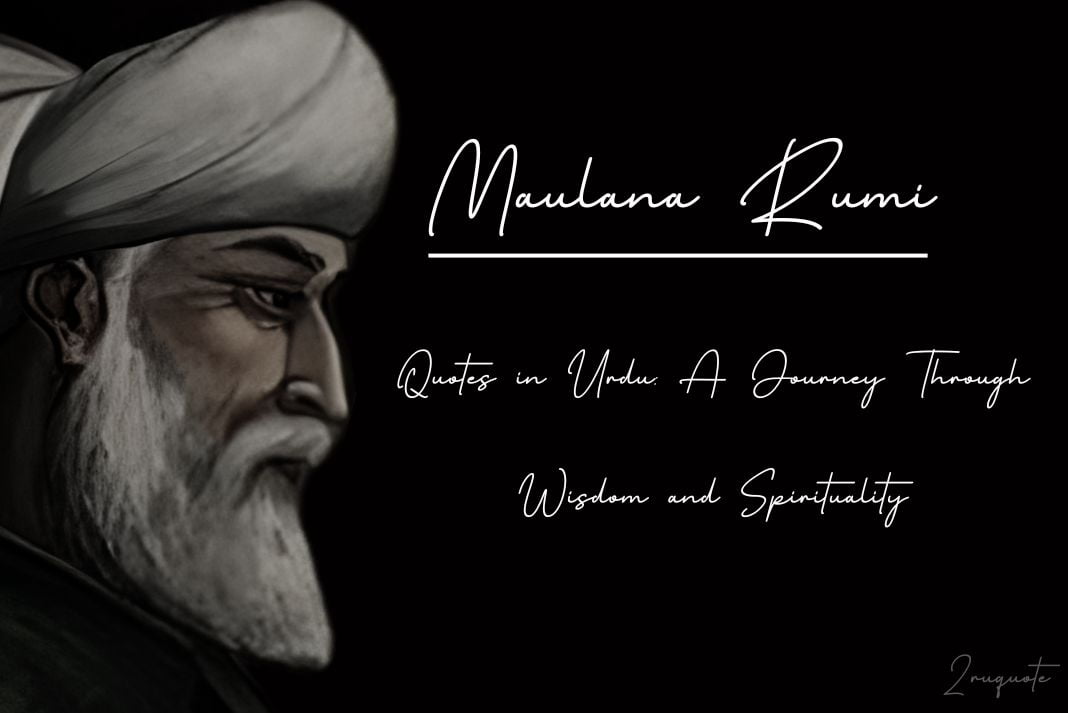“Maulana Rumi Quotes in Urdu” Maulana Jalaluddin Rumi, a 13th-century Persian poet, jurist, Islamic scholar, and Sufi mystic, has captivated hearts worldwide with his profound wisdom and poetic brilliance. His quotes, particularly in Urdu translations, resonate deeply with audiences in South Asia, offering timeless insights into life, love, and spirituality.
Early Life of Maulana Rumi
Rumi was born in 1207 in present-day Afghanistan. He received a traditional education in religious sciences, philosophy, and literature, which laid the foundation for his later works. His early life was pivotal in shaping his worldview and spiritual inclinations.
Rumi’s Philosophical and Spiritual Journey
Rumi’s life took a transformative turn upon meeting Shams Tabrizi, a wandering dervish. This encounter steered him towards Sufism, profoundly influencing his poetic and philosophical works.
The Essence of Rumi’s Teachings
Rumi’s teachings revolve around universal love, the pursuit of spiritual knowledge, and the unity of being. His works, deeply rooted in Islamic and Sufi traditions, emphasize the inner journey towards self-realization and divine love.
Rumi’s Impact on Literature and Culture
Rumi’s contributions extend beyond spiritual realms, significantly impacting Persian literature and influencing Urdu poetry. His metaphors, imagery, and themes have become integral to these literary traditions.
Popular Maulana Rumi Quotes Translated into Urdu
Rumi’s quotes in Urdu cover various themes like love’s transformative power, the soul’s journey towards enlightenment, the importance of self-awareness, and the quest for unity with the divine.
Interpreting Rumi’s Quotes in the Modern Context
In today’s world, Rumi’s words offer guidance for personal growth and understanding, emphasizing love, tolerance, and introspection.
Challenges in Translating Rumi’s Work
Translating Rumi’s poetry into Urdu presents challenges in maintaining the original essence and depth. Each translation varies, offering different interpretations and insights.
Rumi’s Influence Beyond Borders
Rumi’s wisdom transcends geographical and cultural boundaries, gaining recognition and admiration worldwide. His works have influenced thinkers and artists in the West, showcasing the universal nature of his teachings.
Conclusion of Maulana Rumi Quotes in Urdu
Maulana Rumi’s quotes in Urdu embody a timeless wisdom that continues to inspire and enlighten. Their universal appeal lies in their profound simplicity and deep spiritual insights.
FAQs
What makes Maulana Rumi’s quotes so appealing across cultures?
Maulana Rumi’s quotes are appealing across cultures due to their universal themes of love, humanity, and spiritual growth. His words transcend cultural and religious boundaries, resonating with people’s innermost feelings and aspirations.
How do Rumi’s teachings align with modern concepts of spirituality?
Rumi’s teachings align with modern concepts of spirituality by emphasizing self-discovery, inner peace, and a connection to the universe. His focus on love, tolerance, and the journey of the soul mirrors contemporary spiritual pursuits.
What are some common themes found in Rumi’s poetry?
Common themes in Rumi’s poetry include the profound love for the divine, the beauty of life’s journey, and the transformation of the soul. His work often explores the concepts of unity, the ephemeral nature of life, and the pursuit of spiritual enlightenment.
How does Rumi’s Sufi background influence his writings?
Rumi’s Sufi background profoundly influences his writings, infusing them with mystical insights, allegories, and a deep sense of the divine. His Sufi beliefs shape his perspectives on love, the soul’s journey, and the connection between the individual and the universe.
Can Rumi’s quotes be applied to everyday life? How?
Rumi’s quotes can be applied to everyday life as they offer wisdom on universal human experiences and emotions. His insights on love, resilience, and finding inner peace are as relevant today as they were in his time, guiding individuals in personal growth and understanding.








